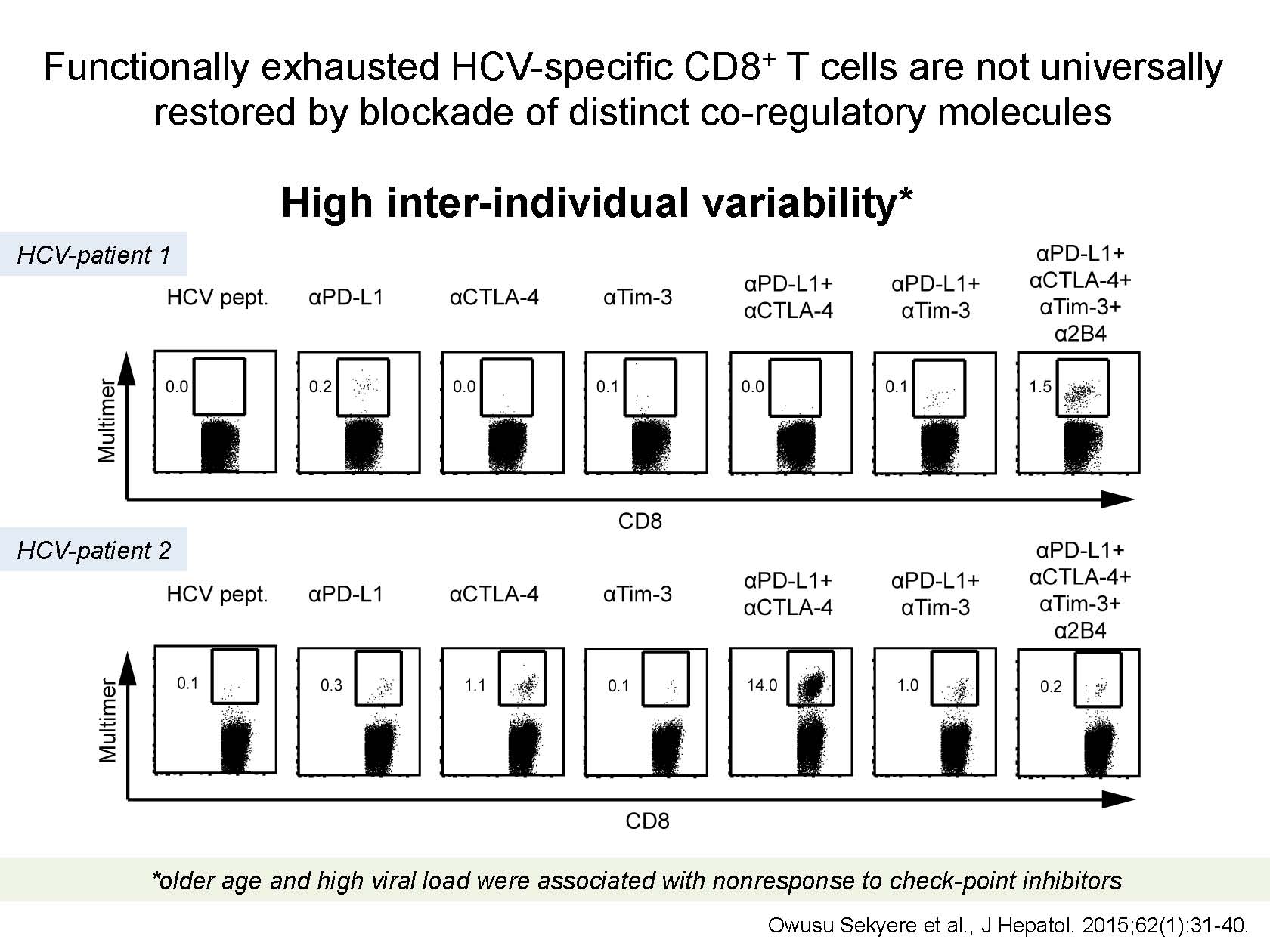Cure of chronic hepatitis C – long-term effects on HCV-specific and heterologous immune responses

Functionally exhausted HCV-specific CD18+ T cells are not universally restored by blockade of distinct co-regulatory molecules
(Owusu Sekyere et al., J Hepatol. 2015)
The central aim of the project of the groups of Markus Cornberg and Heiner Wedemeyer is to understand the effects of co-regulatory molecules on antigen-specific T cell properties during chronic hepatitis C virus infection and how these properties change when the virus is cleared by direct acting antiviral agents (DAA). This model is a unique opportunity to investigate the effect of the pathogen and its clearance on the immune system.
Viral persistence is associated with T cell exhaustion. The failure to control virus infections can be explained in part by up-regulation of co-regulatory “check-point” receptors on virus-specific T cells. We and others showed that antiviral effector functions of hepatitis virus-specific T cells can be increased by blocking T cell co-regulatory pathways such as PD-1, 2B4 or CTLA-4. However, there is large inter-individual variability in responsiveness to this check-point inhibition and optimal combinations need to be defined. In some cases, combination of check-point inhibitors had even negative effects on T cell functionality. In addition it is largely unknown in humans if elimination of a pathogen can restore T cell exhaustion and how this also affects unrelated immune responses.
Scientific approach
This project of Heiner Wedemeyer and Markus Cornberg investigates the effects of blocking several co-regulatory pathways in chronic HCV infections on the virus-specific T cell repertoire and functionality. In addition, we aim to understand in more detail how a persistent viral infection affects co-regulatory molecules and T cell properties (cognate and unrelated) and importantly how this changes when the infection is cleared by DAA.
We will take advantage of the approval of novel DAA against HCV, which will enable a cure of HCV infection in more than 95% of cases and thus allow us to prospectively study the evolution of virus-specific T cell responses and repertoires during and after HCV Elimination.
This project can potentially give new insights into basic principles how persistent virus infections influence T cell responses in humans and might have clinical implications to personalize therapeutic applications of antibodies blocking T cell co-inhibition which are already in clinical use.
Heiner Wedemeyer and Markus Cornberg are talking about their research at CRC 900
Heiner Wedemeyer and Markus Cornberg have been part of the CRC since its founding in 2010 and in project A5 focus on research into chronic hepatitis C infections and their effects on the immune system.
Publications of the project A5
Contact

Prof. Heiner Wedemeyer
Hannover Medical School
Chairman, Dept. for Gastroenterology, Hepatology and Endocrinology
Carl-Neuberg-Str. 1
30625 Hannover
+49 511 532-3305
Wedemeyer.Heiner@mh-hannover.de

Prof. Markus Cornberg
Hannover Medical School
Department of Gastroenterology, Hepatology und Endocrinology
Carl-Neuberg-Str. 1
30625 Hannover
+49 511 532-6821
Cornberg.Markus@mh-hannover.de